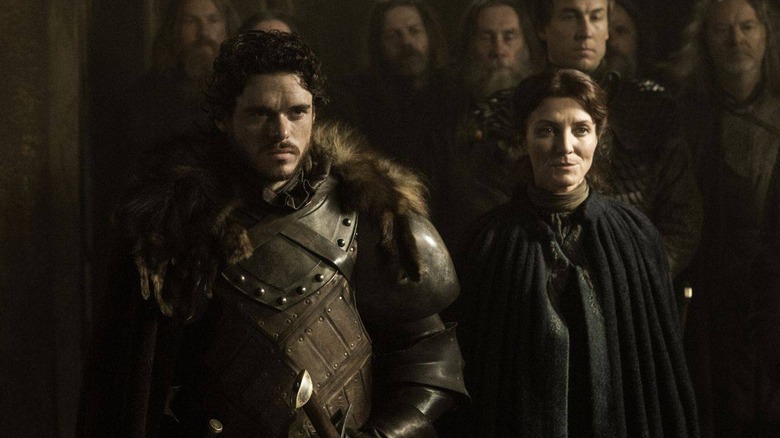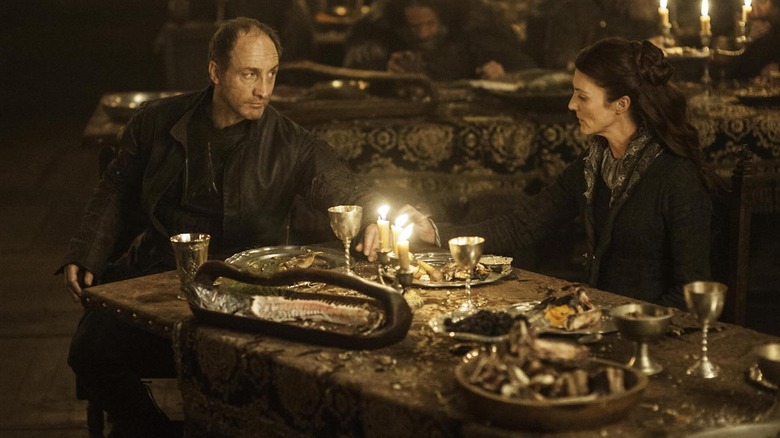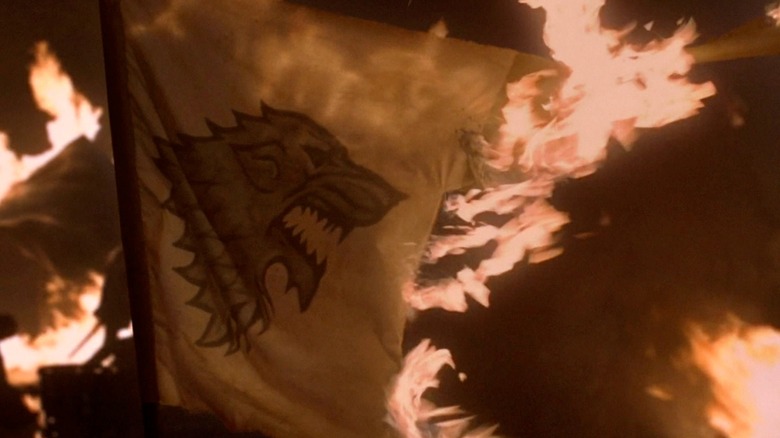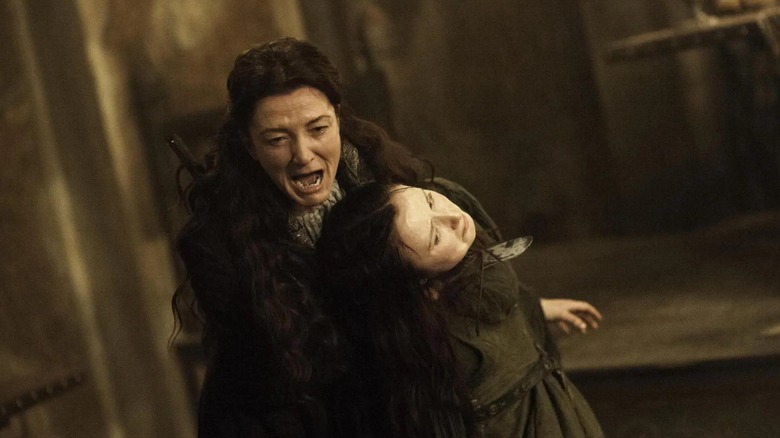Game Of Thrones' Red Wedding 'Shattered' Michelle Fairley In More Ways Than One
For as much as HBO's "Game of Thrones" became known for its excessive sexuality and big-budget blockbuster sequences, it had gained notoriety early on for something simpler: Killing off fan-favorite characters, and refusing anything like a happy ending. While that came straight from the source material, George R.R. Martin's long-running series of fantasy novels, it also defied conventional television wisdom, leaving the show with a complicated legacy.
For instance, the death of de facto protagonist Ned Stark (Sean Bean) in the penultimate episode of the show's first season was shocking and brutal. Considering he was played by a movie star and was one of the few genuinely good-hearted people in the show, his execution spoke to the show's ambition. If he could die, anybody could. And they often did.
The show's most notorious fan-favorite character murder was actually a parade of murders, a wedding-set massacre that turned the show's dynamics on bloody end: The Red Wedding.
For much of the show's first three seasons, Ned's heroic son Robb (Richard Madden) wages a campaign against the ruling Lannisters, forging a tenuous alliance with the Freys that's dependent on his future marriage to one of patriarch Walder's (David Bradley) daughters. He unknowingly sows the seeds for the Red Wedding by marrying Talisa (Oona Chaplin) and defying Walder's agreement. To make up for it, Robb's uncle Edmure (Tobias Menzies) volunteers to marry a Frey daughter, in effect luring Robb, his men, his pregnant wife, and his mother Catelyn (Michelle Fairley) into a trap.
The resulting massacre is probably the show's most traumatizing and upsetting moment. But if it was bad for viewers, it was worse for the cast — Michelle Fairley in particular found herself shattered by the scene.
Morality
For Michelle Fairley, Catelyn Stark was an extremely principled character. "She came from a very honorable family," Fairly said in "Fire Cannot Kill A Dragon," the oral history of the show by James Hibberd. "Her whole life has been about honor and doing the right thing. In some way she'd been held back by her sense of honor and duty," which was true of many of the Starks, and spoke to why they would fail to win in the show's cutthroat, titular game.
While "Game of Thrones" embraced a certain degree of gray morality over traditional fantasy archetypes, it was still a show with heroes and villains. You rooted for the Stark family, whose virtues and bad luck made them instantly sympathetic. You rooted against the Lannisters, like Cersei (Lena Headey) and Tywin (Charles Dance), whose vicious scheming made them fun to hate, even though the performances were strong enough to help you to understand them. Of course, there were countless factions and families on the show, and even more characters who defied categorization into "good" or "evil."
Still, the deaths of so many Starks made the Red Wedding painful, and especially memorable. The episode in which it happens, season 3's "The Rains of Castamere," is one of the show's best.
The murders felt like something that broke the rules of the show, and the betrayal it indicated from Walder Frey made him one of the show's most hated characters. It was even worse that in the next episode, Catelyn's young daughter Arya (Maisie Williams), having been separated from her family for two full seasons, expects a reunion at Frey's castle, the Twins. She doesn't get one.
The carnage
The scene was difficult to watch, for the viewers and for actors on the show like The Hound's Rory McCann. Whatever fun and warmth the characters find before the massacre starts, Michelle Fairley's reaction shots show Catelyn is at least a little suspicious.
The titular song, "The Rains of Castamere," is played by the wedding's band. In universe, the song tells the story of Tywin Lannister's great triumph over a rebellion. Why would the band play it at a wedding uniting families against the Lannisters? At her table, Catelyn sees a bit of chain mail on Roose Bolton's (Michael McElhatton) arm, realizing he has come to this wedding to do battle. She slaps him, yells out to her son, and then the carnage begins.
Whether it's the particularly sadistic stabbing of Talisa (going straight for her pregnant belly) or the archers shooting Robb, the moments that follow leave no room for hope. Walder Frey, having gotten snubbed with Robb's marriage, gets to enjoy his vengeance, sipping wine as he watches from his table.
But the most shocking beat of the set piece is when Catelyn, already wounded, snatches up Walder's teenage wife Joyeuse (Kelly Long) and holds a knife to her throat. A character who has survived the challenges and pain of seasons past with the utmost composure is now breaking her own code. To that, Walder replies that he'll just find another. Robb is killed by Roose. And Catelyn breaks down into a silent cry, Michelle Fairley's performance exposing the most heartbroken side of the character. She kills Frey's wife, stares into the distance, and has her own throat slit.
Shattered
To see a character like Catelyn totally break down was one thing. But knowing that Michelle Fairley was herself heartbroken by the experience makes it another. While "Game of Thrones" often kept characters' emotional lives at a bit of distance, even in the moments they were facing down death, this bit of performance saw something terrifyingly real in Catelyn's plight. Her husband dead, her son dead, her daughter-in-law and expected grandchild dead, some of her kids missing ... all of it lead to her being willing to murder an innocent young girl before dying herself.
"She couldn't go on," Fairly recalled in "Fire Cannot Kill A Dragon." And the unnervingly long, slow push-in on her after killing Joyeuse emphasizes that helplessness, her inability to move or fight any longer. As director David Nutter recalled, that ended up being the final shot they got of Catelyn, and of Michelle Fairley — a bleak conclusion to one of the show's strongest performances. "By the end of the day," Fairley said, "I was a walking shell."
Showrunner D.B. Weiss even reached out to Fairley after filming on the episode wrapped, but she didn't return his calls. In fact, it took her a week to finally reply via email, and according to Weiss, the email said, "Sorry, I haven't been able to talk to anybody about the show for the past week because I've been so shattered."
After the Red Wedding, the show began to take a slight turn into more positive territory, ultimately becoming a broader, less complex, more action-packed show in time for its disordered ending. But the series' commitment to the terror of the Red Wedding, and the performances like Fairley's that made it happen, ensured it was one of the most haunting hallmarks of the show's legacy.



